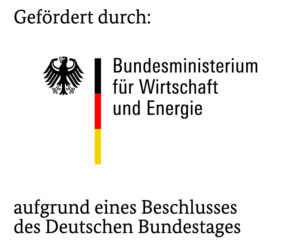
The B²-Monitor project (Millimeter-Waves for Monitoring Bats and Blades) is funded by the Federal Ministry for Economic Affairs and Energy. Grant number: FKZ 0325791A (funding period: May 2015 – April 2018), project budget: 326.063 EUR
Introduction:
Millimeter-wave and terahertz technology have been used successfully in non-destructive testing (NDT) applications in order to identify material defects such as delamination, heat damages and inclusions. While being safe for human beings and animals, a high resolution imaging in a non-contact and non-destructive way is possible due to the short wavelengths.
Objective 1: Rotor blade inspection with a permanently installed radar sensor
B²-Monitor will extend the millimeter-wave and terahertz technology from a classical NDT methodology towards a continuous structural health monitoring (SHM) approach for load carrying technical structures. For the first time, we will propose a scalable radar-based SHM-concept for wind turbine blades, where the transmitting and receiving antennas are operated along the tower and where the antennas radiate the electromagnetic waves towards the rotor blades. Exploiting the rotation of the wind turbine and therewith a synthetic aperture with regard to the iSAR (inverse synthetic aperture) principle, all blades can be inspected with a single sensor array along the turbine tower in a non-contact and highly automated manner. This approach has economic relevance not only for new but also for ageing wind turbine structures.
Objective 2: Radar-based detection of bats close to the wind turbine
The same radar sensor will be used in B²-Monitor for the detection of bat activities close to the wind turbine which is highly relevant for the permission to operate existing and newly installed turbines. The detection results of the radar sensor will be compared with a camera-based system and signals recorded by ultrasound sensors.
Objective 3: Development of a new wind turbine control strategy
Based on the evaluation of the condition status of the turbine (objective 1) and the knowledge of the instantaneous bat activity (objective 2), new and harmonizing concepts for the operation of wind turbines can be established that account for the demands of the wind turbine operator (and hence public energy supply) as well as the protection of nature. We will demonstrate the approach in a field test on a real 2-MW wind turbine.